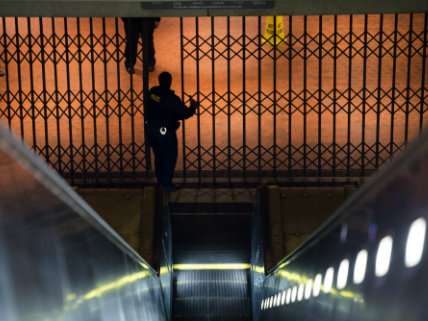Nationals' Pitcher Max Scherzer Thinks DC Metro Should Care About Supply and Demand
Maybe it should, but that's not how government works.

More than 40,000 fans are expected to pack into Nationals Park on Thursday night for a winner-take-all playoff game between the Washington Nationals and the Los Angeles Dodgers.
When the game ends, though, many of those fans might find themselves stranded.
That's because the D.C. subway system closes at midnight during the week, and the WMTA, which runs mass transit in the nation's capital, says it will not extend operating hours to accommodate fans attending Thursday's Game 5 of the National League Division Series. First pitch is scheduled for 8:08 p.m. and the first four games in the series have taken an average of nearly four hours to play. That makes it likely that the final out of Thursday's game won't be recorded until near—or just past—closing time for the metro.
Max Scherzer, the Nationals' superstar pitcher and expected starter in Thursday's game, thinks the WTMA should extend its operating hours on Thursday. Anyone familiar with the D.C. metro will get a little chuckle out of his logic.
"God, I would hope to believe that playoff games here in D.C. would mean more than shutting down the lines for a couple hours," Scherzer said last week during an appearence on a local sports talk radio program. "I mean, isn't it a supply-and-demand issue? We have a supply of people that demand to use the line to go to the park. Why wouldn't you want to meet that?"
Scherzer gets paid to throw baseballs, not to analyze public policy, so give him a pass for failing to understand that concepts like "supply" and "demand" don't mean a whole lot to government bureacracies like the WMTA.
And the DC metro is the worst kind of bureaucracy. It's a toxic mix of unaccountable staff, broken escalators, burning tracks and misplaced spending priorities. All the problems are driving people away from using the subway, a trend the WMTA says they are trying to reverse.
That might seem like a reason to stay open an hour later on Thursday night for the chance to capture tens of thousands of potential riders leaving Nationals Park. Nope.
Were the DC subway a private business, Scherzer would probably be right. Alas, the DC metro doesn't have to turn a profit to continue to operate because it's going to get its funding from the taxpayers of Maryland, Virginia and Washington, D.C., whether it's open at the conclusion of Thursday's game or not—in fact, it recently got an extra $1 billion annually because it's so awful.
Without a profit motive, the only thing that can get the metro to change policies is political pressure. That's not proving too effective in this case, despite Jack Evans, chairman of the WMTA board of directors, saying last week that it will look "foolish" if 15,000 people have to leave a Nationals playoff game early to catch the last train of the night.
It's just an embarrassment," he said, according to the Washington Post, which reports that Evans wants to keep the subway open late if the Nationals make the World Series (getting there would require winning Thursday and winning another series after that, which brings with it the potential of three more home games with 8 p.m. start times).
Other local officials in D.C. are mostly shrugging their shoulders. Mayor Muriel Bowser suggested that Nationals' fans should be "creative" about getting home from the game on Thursday.
Luckily for Nats' fans, there are other transportation networks in the D.C. area that do cater to supply and demand. Ride-sharing services like Uber and Lyft will be available after the game on Thursday, but expect to pay surge prices if you want a ride home—that's part of supply and demand too, after all.


Show Comments (51)